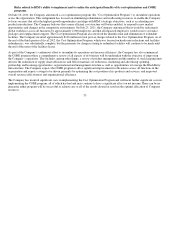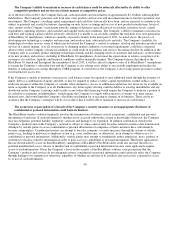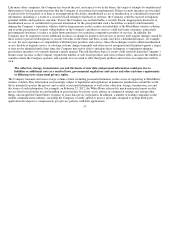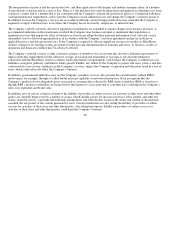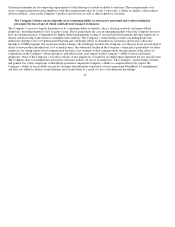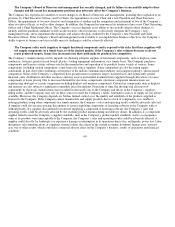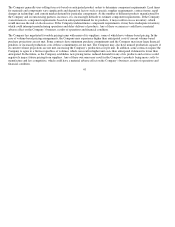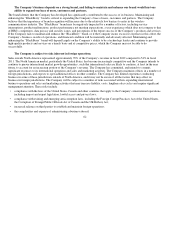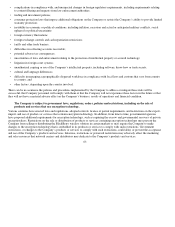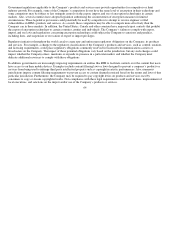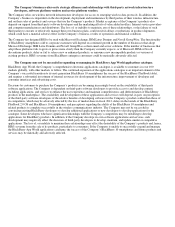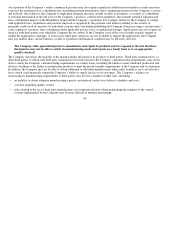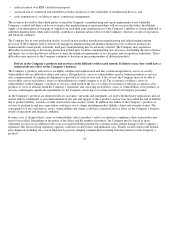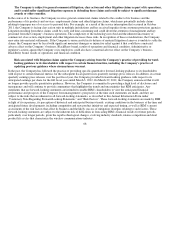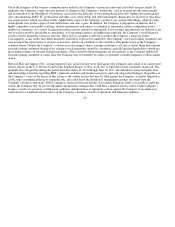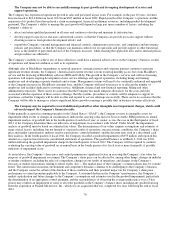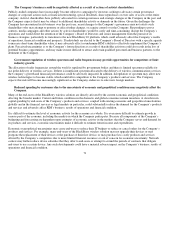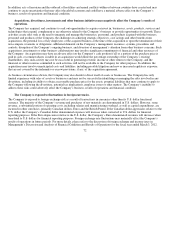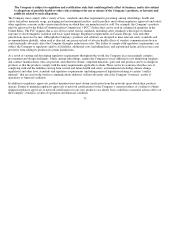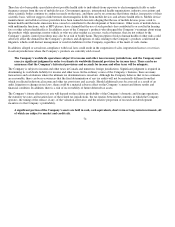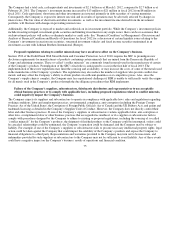Blackberry 2012 Annual Report Download - page 73
Download and view the complete annual report
Please find page 73 of the 2012 Blackberry annual report below. You can navigate through the pages in the report by either clicking on the pages listed below, or by using the keyword search tool below to find specific information within the annual report.
The Company’s business relies on its strategic alliances and relationships with third-party network infrastructure
developers, software platform vendors and service platform vendors.
The Company relies on wireless network infrastructure developers for access to emerging wireless data protocols. In addition, the
Company’s business is dependent on the development, deployment and maintenance by third parties of their wireless infrastructure
and on their sales of products and services that use the Company’s products. Market acceptance of the Company’s products also
depends on support from third-party software developers and the marketing efforts of value added resellers, Internet service providers
and computer manufacturers and distributors. The loss of, or inability to maintain, any of these relationships, or the failure of such
third parties to execute or effectively manage their own business plans, could result in delays or reductions in product shipments,
which could have a material adverse effect on the Company’s business, results of operations and financial condition.
The Company has designed BES to be used with Microsoft Exchange, IBM Lotus Domino and Novell GroupWise. The functionality
of BlackBerry smartphones sold to corporate customers will depend on continued growth in the number of businesses that adopt
Microsoft Exchange, IBM Lotus Domino and Novell GroupWise as their email and server solutions. If the number of businesses that
adopt these platforms fails to grow or grows more slowly than the Company currently expects, or if Microsoft, IBM or Novell
discontinue products, delay or fail to release new or enhanced products, or announce new incompatible products or versions of
existing products, RIM’s revenues from BlackBerry enterprise customers could be materially adversely affected.
The Company may not be successful in expanding or managing its BlackBerry App World applications catalogue.
BlackBerry App World, the Company’s comprehensive electronic applications catalogue, is available to customers in over 100
markets globally, with other markets to follow. The continued expansion of the applications catalogue is an important element of the
Company’s successful transition to its next-generation BlackBerry 10 smartphones the success of the BlackBerry PlayBook tablet,
and requires a substantial investment of internal resources for development of the infrastructure, improvement of developer and
consumer interfaces and advertising costs.
Decisions by customers to purchase the Company’s products are becoming increasingly based on the availability of third-party
software applications. The Company is dependent on third-party software developers to provide access to and develop content,
including applications, and services to enhance the user experience and maintain competitiveness and differentiation of BlackBerry
products in the marketplace. The availability and development of these applications and services will depend, in part, on perceptions
of the third-party software developers of the relative benefits of developing software for the Company’s products rather than those of
its competitors, which may be adversely affected by the loss of market share in fiscal 2012, delays in the launch of the BlackBerry
PlayBook 2.0 OS and BlackBerry 10 smartphones, and perceptions regarding the ability of the BlackBerry 10 smartphones and
related products to complete successfully in the wireless communications industry. The Company may not be successful in
convincing existing BlackBerry developers to develop additional applications or new developers to develop applications for the
catalogue. Some developers who have significant relationships with the Company’s competitors may be unwilling to develop
applications for BlackBerry products. In addition, if the Company develops its own software applications and services, such
development may negatively affect the decisions of third-party developers to develop, maintain, and update similar or competitive
applications. The loss of, or inability to maintain these relationships may affect the desirability of the Company’s products and, hence,
RIM’s revenue from the sale of its products, particularly to consumers. If the Company is unable to successfully expand and manage
the BlackBerry App World applications catalogue, the success of the Company’s BlackBerry 10 smartphones and future products and
services may be materially and adversely affected.
65


